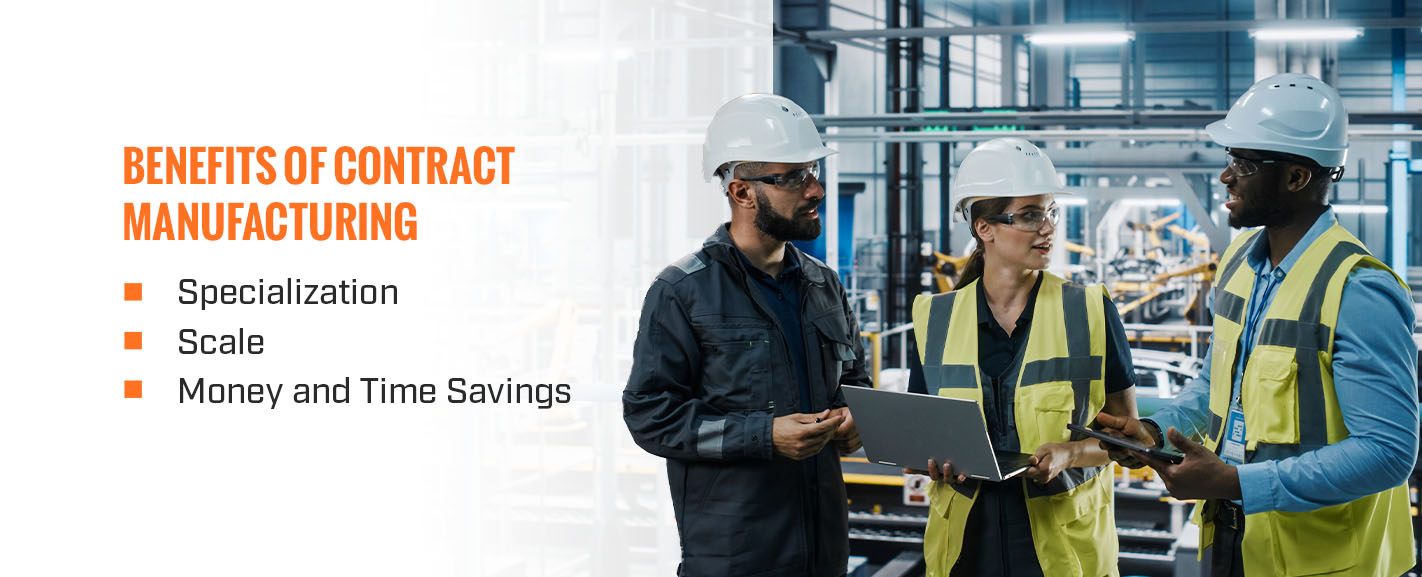
Businesses have many ways to approach the process of product manufacturing. While in-house manufacturing may be viable for some organizations, many businesses opt to have a third party manufacture some or all of their product components. If you’re interested in third-party manufacturing, then it’s important to understand the different options that are available to you.
As you research various forms of third-party manufacturing, two types are often brought up and compared — contract manufacturer (CM) and original equipment manufacturer (OEM). But what are CM and OEM? Discover the main differences between contract manufacturing vs OEM below so you can make the right choice for your manufacturing needs.
An OEM, or original equipment manufacturer, is a factory that uses designs provided by the client to make a product. If you enter a contract with an OEM, you must provide the OEM with detailed product specifications and original designs in order for them to make the product. Several types of OEM arrangements exist, ranging from using a customized design of a product the OEM already manufactures to creating a nearly new product that only has a few similarities with existing ones.
It’s common in OEM arrangements for the client to have to pay for the creation of custom molds and custom tooling to achieve the desired end results according to the product’s specifications. Keep this in mind as you learn more about the differences between contract manufacturing and OEM.
Here are a few pros and cons of OEM that you should know about:
Contract manufacturing, or CM for short, is a broad term that describes a type of product manufacturing that is a step past the capabilities of OEM. In a CM arrangement, the hiring firm has a new product that is yet to reach the market. The hiring firm gives the CM their product specifications and design, and the CM then contracts out the manufacturing process to the third-party manufacturers that can best get the job done.
CMs handle entire processes from their inception. They can build a prototype, prove that it works, make adjustments as needed, handle entire production runs and even handle logistics and packaging. They can contract out any and all of these steps as needed, ensuring the hiring firm’s product can get to market.

Contract manufacturing can provide many benefits to businesses seeking to bring a product to market.
Contract manufacturers have the capabilities to produce products of all shapes and sizes across all industries. Contract manufacturing can handle even the most complex needs, ensuring any and all products reach the market with success. This level of specificity ensures you can get the results you’re looking for.
Contract manufacturers work with specialized component manufacturers that can deliver specialized, sophisticated parts using the latest technology. These firms have a highly skilled workforce that can meet your product’s needs according to its specifications. Rather than investing in your own labor force to craft these products, get the specialization you’re looking for by working with a contract manufacturer.
Scaling the manufacturing process of your product is easily possible with contract manufacturing. Due to CM’s level of specialization, the CM company can benefit from the economics of scale depending on the size of the hiring company. The CM is only limited by the contract arrangements. This means if you need a large production run and are willing to pay for it, then the CM can get it done by contracting out elements of the process that make such production possible.
Plus, your CM can often buy materials in bulk to achieve a discounted price while getting the increased number of parts you need at a faster rate.
The two previous benefits of specialization and scale combine to offer hiring companies great value and savings throughout the manufacturing process. Besides saving you money on facilities, materials and labor, working with a CM cuts the amount of time needed to go from concept to finished product. This ensures your product can get to market as fast as possible, helping you meet your profit goals and timeline.
If you’re thinking about outsourcing your product’s manufacturing to a contract manufacturer, here are some best practices you should follow:
At PBZ Manufacturing, our mission is to build relationships of exceptional value as we develop, manufacture and finish your unique project. Our contract manufacturing process offers a resourceful solution that can streamline your supply chain, shorten project completion times and lowers your operational costs. We have a wide variety of capabilities that sets us apart from our competition, ensuring your product reaches the market exactly as you want it to.
Contact us today if you are ready to take the next step!